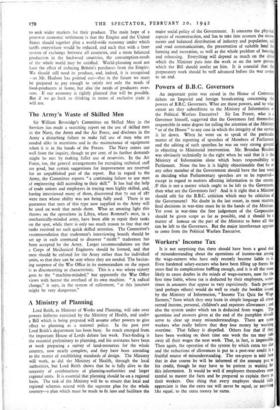The Army's Waste of Skilled Men
Sir William Beveridge's Committee on Skilled Men in the Services has made a searching report on the use of skilled men in the Navy, the Army and the Air Force, and discloses in the Army a disturbing failure to make full use of men who are needed alike in munitions and in the maintenance of equipment when it is in the hands of the Forces. The Navy comes out well from the inquiry, though to per cent. of its further demands might be met by making fuller use of reservists. In the Air Force, too, the general arrangements for recruiting technical staff are good, but certain suggestions for improvement are reserved for an unpublished part of the report. But in regard to the Army, the Committee reports " a continuing failure to use men of engineering skill according to their skill." It has had the help of trade unions and employers in tracing men highly skilled, and, having interviewed many of them, discovered that 71 out of 187 were men whose ability was not being fully used. There is no guarantee that men of this type now supplied to the Army will be used on work that needs them. What an amazing light this throws on the operations in Libya, where Rommel's men, in a mechanically-minded army, have been able to repair their tanks on the spot, while there is only too much reason to fear that our tanks received no such quick skilled attention. The Committee's recommendation that tradesmen's interviewing boards should be set up in each command to discover " misfit " tradesmen has been accepted by the Army. Larger recommendations are that a Corps of Mechanical Engineers should be formed, and that men should be enlisted for the Army rather than for individual units, so that they can be sent where they are needed. The hesitat- ing suspense of the War Office in its memorandum on the report is as disconcerting as characteristic. This is a war where victory goes to the " machine-minded," but apparently the War Office views with horror the overhaul of its own machine. " A radical change," it says, in the system of enlistment, " at this juncture might he very dangerous."


























 Previous page
Previous page